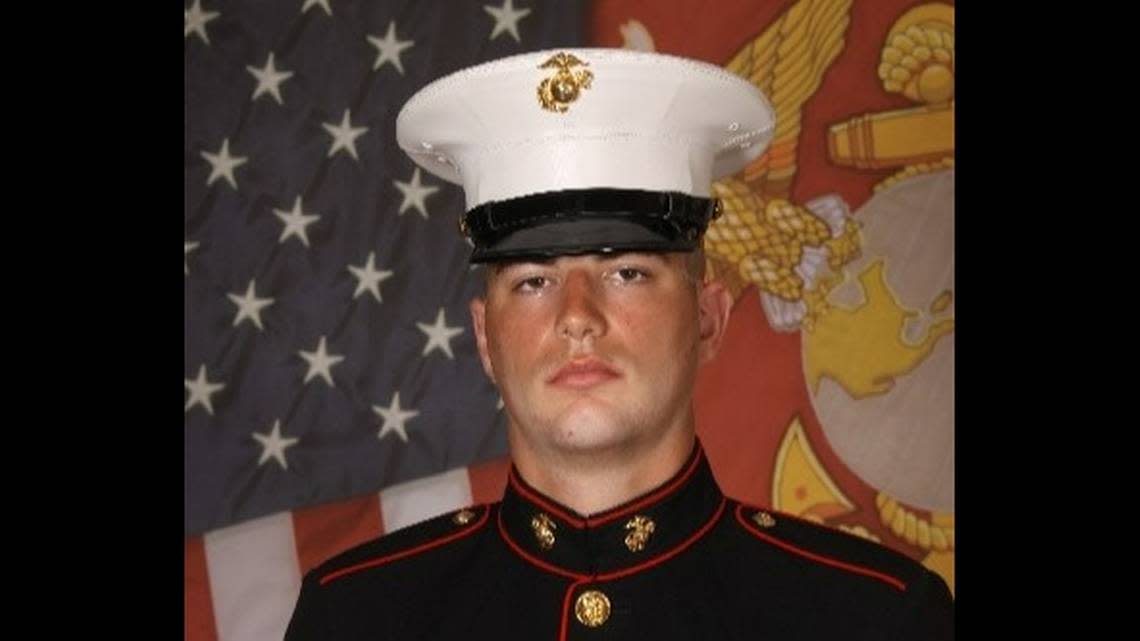Prosecution argues Parris Island drill instructor missed signs of fatal risk to Marine recruit
It was another hot and humid day at U.S. Marine Corps Recruit Depot Parris Island in Port Royal, S.C. on June 4, 2021. Recruits were gritting it out through combat training that included hiking with packs while wearing bullet-proof vests, fighting hand-to-hand, taking simulated enemy fire and using training blanks to return volleys. It was all part of the Crucible, three days of physical and mental testing before graduating as Marines.
Three recruits collapsed from the heat on that day. One recruit was put in a “polar bag” to reduce his temperature. He and a second recruit, a woman, recovered. But Dalton Beals, a 19-year from New Jersey, died from hyperthermia after he was missing for an hour.
His death is the focus of a trial at the South Carolina Marine Corps base that could last up to three weeks. Staff Sgt. Steven Smiley, Beals’ drill instructor, is charged with negligent homicide. He’s pleaded not guilty.
Prosecution paints a dire picture
Prosecutors are alleging Smiley went too far, overworking the recruits, and didn’t recognize Beals’ symptoms or heed concerns expressed by recruits. But his defense team says it was a heart condition that caused Beals death, not Smiley’s actions.
Dr. Ellen Riemer of the Medical University of South Carolina, a cardio and pulmonary specialist who performed the autopsy for Beaufort Memorial Hospital, testified on behalf of the prosecution on Wednesday. She said that Beals died of hyperthermia, which is a dangerously overheated body.
On Thursday and Friday, the prosecution focused questions on Smiley’s monitoring of the 12 recruits that made up his team — especially Beals, who some recruits have testified was having obvious physical difficulties due to the heat before he went missing and was later found dead in the woods.
Recruits have been asked to describe extra drills Smiley reportedly had them perform in the heat.

There’s also been questions about “accountability,” or the regular counting of recruits to make sure all are present, whether the buddy system was used and queries about heat-related illness rules and training.
The prosecution also raised issues with conversations Smiley and recruits had before they were questioned by investigators, and whether Smiley attempted to influence what they said.
Lt. Col. Ian Germain, a prosecutor, asked Eric Hughes, a recruit who was in Beals’ team, if he recollected Smiley advising the recruits after Beals’ death to make sure they had their stories straight. Hughes said he interpreted Smiley’s comments to mean that the recruits tell the truth, not that they should line up their accounts of what happened.
More than two years after that tragic day, recruits sometimes have needed reminders during their testimony about some details they initially provided during the investigation. The memory prompts come from the transcripts recorded at the time of the incident.
These then-recruits were the last people to see Beals alive and have described for the eight-person jury what they saw.
“I asked him if he was OK,” Lance Cpl. Mason Archer said. “He just said it was just really hot. He just looked more tired and more strung out.”
Hughes said Beals asked him to fill up his canteens for him when they already were full. “I said, ‘These are full dog,’ and gave ’em back,’” said Hughes, who described Beals as an above-average and “excellent” recruit.
At one point, Cpl. Jahsaan Bryant testified, Smiley asked Beals, “Are you good?”
“Yes sir,” Beals responded, “just tired.”
Bryant, who was eating an MRE — meal ready to eat — heard Beals say he needed to go to the bathroom. When a count was taken later, Beals was missing. When Smiley was told his whereabouts were unknown, “He had a surprised, concerning facial expression,” Bryant said.
Smiley and others left to search for Beals, who was discovered in the woods.
Bryant saw CPR being performed on Beals in the woods when he brought ice to the location. When they learned about Beals, most of the recruits in the team were “crying silently,” Bryant said.
The trial is actually a military court martial. When the jury was being picked, some members of the jury pool, made up of of Marines at Parris Island and the Eastern Recruiting District, raised their hands when asked if they knew Smiley. The jury includes only those who are senior in rank to Smiley — gunnery sergeant and above.
In the military trial, jurors are allowed to ask questions. When they do, they raise their hands and write them down. Judge Col. Adam Workman then reads them aloud.
Were nicknames out of line?
Recruits testified Friday Smiley called them “pig,” “war pig” and “sweet bacon” during the Crucible. Marine rules only allow drill instructors to call recruits by their billet, name or rank, said Capt. Heather Judy, a series commander, who supervises recruit training, testified. “We enforce it as best we can,” Judy said.
But Archer said he “thought it was pretty cool” being called “war pig.” Bryant said he thought the nickname sweet bacon was “funny.”
A foreboding warning?
Smiley told team members before the Crucible “we were going to get it pretty bad,” then-recruit Hughes said.
On cross examination from the defense, Hughes said he didn’t take that to mean that Smiley was going to intentionally break one of the recruits, just that it was going to be difficult.
Marines who served at Parris Island in various capacities during the time of Beal’s death are being flown in from across the country and world to testify.
The prosecution is presenting his case and will resume calling witnesses on Monday.
